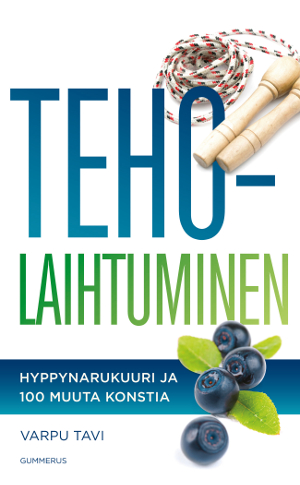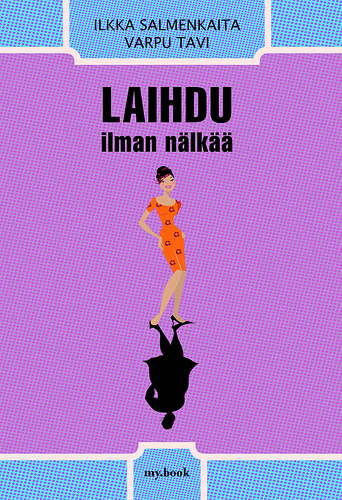Postia Anthony Colpolta, joka nykyisin vhh-piireissä herättää suurta närää, koska kritisoi yhtä hellityimpää vhh-dogmia (tai myyttiä, riippuu näkökulmasta): ajatusta aineenvaihdunnallisesta edusta vhh-dieetistä (ärsytystä herättää myösColpon ilmaisutyyli, joka on hyvin ärhäkkä, mutta hänen kirjoituksensa ovat aina huolellisesti lähdeviitteiden avulla perustellut, toisin kuin niin monien muiden ärhäköitten kirjoittajien). Juttu on pitkä, siinä mainostettavista kirjoista olen lukenut vain nuo molemmat Colpon kirjat ja suoittelen niitä lämpimästi.Samoin kuin Colpo, suosittelen myös Tom Venuton kirjoja ja kirjoituksia lämpimästi, mutta minäkään en ole lukenut Venuton uusinta.
Oma kantani kaloriteoriaan lyhyesti: kun kaloreita menee sisään ja ulos ihmisessä, niiden toiminta ei ole ihan yksiselitteistä. Tapahtuu siis muutakin kuin, että leivästä tulee kakkaa. Niinpä PELKÄN kalorivajeen tuijottaminen on turhauttavaa (ja mahdollisesti täysin hyödytöntä) touhua. Laihduttajan on viisampi keskittyä nälänhallintaansa. Mutta en myöskään usko, että kaloriteoriaa voitaisiin unohtaa. Vhh:n hyöty laihduttamisessa on nälättömyys, joka mahdollistaa tiedostamattoman kalorivajeen.
Reader Question: Hi Anthony, I just read your LDL Cholesterol: ”Bad” Cholesterol, or Bad Science? article and I am so moved, and really appreciate all your work. I have some questions that I am trying to answer…if you could take a moment. I am trying to find the right ”diet” that I should be eating. I am one year out from gastric bypass [surgery] and have now lost 115 pounds. Awesome – but, I have about 40 more to go and its so slow, its driving me crazy. For the past 4 weeks I’ve been trying a high fat, low carbohydrate diet since one of my co-workers has explained to me that it’s the carbohydrates that raise your insulin level and promote excess fat and cholesterol to form inside your body. Thus, I am a little confused because all the dieticians here in USA promote a diet which is low fat and low carbs and then I’m always starving! Eating the fat in milk, nuts and cheeses seem to help, but I am worried about my cholesterol levels. So, I will be taking a blood test soon at my primary doctor’s office. Last year, I went to a heart doctor, he put me on Lipitor (80 mg) and said to go on the South Beach Diet. Well, I did that and then I went on a High Protein, Low Fat, NO Carb diet for 3 weeks and lost 30 pounds…but my cholesterol levels are still high (I think about 200 or more) so I’m back on Lipitor (40 mg per day). So, if I eat saturated fat, some dieticians say it will cause my levels to go higher and other people say its not from what you eat but its hereditary. So, I am totally confused. Do the levels go higher when you eat fat, or not or is it just hereditary and there is nothing you can do? Do carbohydrates cause the levels to go higher in the blood because of the increase of glucose and then insulin, and insulin resistance? I just don’t understand how our bodies work – can you suggest some reading material that will explain the truth? Thanks for your help in advance. Sincerely, GK.
Anthony replies: Hi GK, I’m glad you enjoyed my LDL Cholesterol: ”Bad” Cholesterol, or Bad Science? article. You have asked for further reading material that will explain the truth about how our bodies work. Well, I’ve written 2 books [insert greatly overused cliche about shameless self-promotion here] that should help you immensely: The Great Cholesterol Con and The Fat Loss Bible. The first demolishes the lipid (cholesterol) hypothesis of heart disease, the second destroys so much of the nonsense that has been leading frustrated dieters astray for decades. The Fat Loss Bible will also help you design an effective weight loss strategy in a logical step-by-step manner.
— The first is that the cholesterol theory of heart disease is a complete sham. Despite what health authorities claim: * Dietary clinical trials have completely failed to show any benefit for cholesterol-lowering low-fat and low-saturated fat diets. Some of these trials actually showed worse outcomes on the cholesterol-lowering diets. * Autopsy studies and PET scans show no correlation between level of cholesterol and degree of atherosclerosis. These studies have shown that people with very low cholesterol levels can have severely diseased arteries. * The vast majority of population-based studies show no link between saturated fat consumption and heart disease. As for LDL, fish oil lowers heart disease incidence and mortality but often raises LDL. Call me strange, but if I had to choose between politically incorrect LDL levels or death, I’d go with the former. These are but a few of the many contradictions inherent in the pseudo-scientific absurdity that constitutes the cholesterol or lipid hypothesis of heart disease. You mention that your doctor has placed you on the cholesterol-lowering statin drug Lipitor. If I were you, I would ask my doctor why he has prescribed one of the statins – a class of drugs that have been documented to cause muscle and tendon disorders, liver toxicity, memory loss, mood disorders, and sexual dysfunction – even though they have not been shown to extend the life of females by a single day.
This fact was published in one of the world’s most widely read medical journals five years ago. I’m not sure what fanciful reply you’ll get from your doctor, but the truth is that health authority and drug company propaganda exerts far more influence over most doctors’ prescribing habits than actual scientific data (when a doctor tried to push my Mum onto statins a few years ago, she offered to print and give him a copy of the above study; he replied that if she did he would refuse to read it! Evidently, he had already made up his mind on the topic and a little thing like published peer reviewed research was not going to make him re-consider his erroneous beliefs). I won’t spend any more time commenting on the cholesterol fraud, I have already written at length on the topic in The Great Cholesterol Con. If you’re not convinced the lipid hypothes is nonsense after reading that then there’s likely nothing more I can say to convince you. I’ll simply reiterate here that cholesterol reduction is a bad joke that benefits no-one but drug companies, certain segments of the food industry, pathology companies, and health organizations that receive funding from drug companies and food manufacturers. As such, it would not factor into any of my dietary strategies, and that includes body fat reduction.
People obsess over their cholesterol levels, succumbing to toxic drugs and all sorts of idiotic diets in an attempt to pound them down, when they should be spending their time and effort on far more important and effective strategies: namely, keeping their bodily iron levels low (but not deficient), achieving good glycemic control, avoiding or minimizing stress, taking clinically proven nutritional supplements, and consuming an antioxidant- and nutrient-rich diet.
The second main point I would like to convey is that the ultimate determinant of successful weight loss is not insulin or carbohydrates. Nor for the record, is it ”eating right for your body or blood type”, eating alleged metabolism-boosting ”wonder foods” such as coconut oil or red chilli, food combining, emulating the alleged eating habits of certain ethnicities, or any other such nonsense. As I explain in The Fat Loss Bible, the ultimate determinant of fat derived weight loss is ”calories in versus calories out”. No calorie deficit, no fat-derived weight loss. Period. This has been shown time and time again in tightly controlled metabolic ward studies dating back as far as the 1930s. Thanks to the hyperbolic writings of popular low-carb gurus, many people now erronously believe that carbohydrates and insulin are the prime movers of fat loss and gain. Sure, short term studies have shown that insulin can result in transient impairments of fat oxidation, but it’s a big leap to claim that this therefore results in longer term impairment of actual body fat loss.
When subject to scientific scrutiny, the insulin theory of fat loss does not hold up. Researchers have found that: * Differences in insulin resistance do not predict weight loss in response to calorie restricted diets in obese women[1]. * Differences in glycemic status do not predict weight loss in response to calorie restricted diets in obese subjects[2]. * Inhibition of insulin secretion by diazoxide had no effect on weight loss in hyperinsulinaemic obese subjects during an 8-week weight-loss diet[3]. Most important of all, actual clinical trials conducted under ward conditions – rather than notoriously unreliable free-living conditions – have shown that low-carb and zero-carb diets offer no fat loss advantage over isocaloric (equal calorie) higher-carb diets. This finding has been observed at very low-calorie intakes, moderately calorie restricted diets, and in eucaloric (weight maintaining) diets. It has been observed in metabolic wards around the world, in both non-diabetic and type 2 diabetic subjects, and has been consistently reported in published papers dating as far back as 1935. Nonetheless, this finding is routinely ignored by authors of popular low-carb diet books, who have made a fortune telling people that their diets offer a magical ”metabolic advantage”. Not only have I completely debunked metabolic advantage dogma (MAD) in The Fat Loss Bible, I’ve also written a highly popular free ebook on the subject: They’re All MAD! This is not to say that low-carb diets are without value. It has been shown in clinical trials that low-carb diets often exert appetite-suppressing effects that lead to unintentional reductions in caloric intake. It is this reduction in caloric intake, not some highly-hyped but non-existent ”metabolic advantage”, that is responsible for any subsequent fat-derived weight loss. However, if a low-carb diet is employed but does not produce a calorie deficit, then no fat-derived weight loss will occur. I only recommend low-carb diets with certain caveats, the main one being to avoid very-low-carb (ketogenic diets) at all costs. This means eating a bare minimum of 60 grams of carbohydrate per day, and much more if you are highly active. – – You mention that you lost a significant amount of weight, but that your progress has since diminished to a frustratingly slow pace. Most diet authors either have no clue how to deal with this, or recommend largely ineffective strategies such as further reducing carbohydrate intake in the vain hope that this will somehow re-ignite fat loss. Here’s what happened in a nutshell: when you first began the South Beach Diet, you were consuming a calorie deficit. As you lost weight, this calorie deficit disappeared. Weight loss reduces your daily calorie burn by 2 main mechanisms: 1. Both lean and fat tissue consumes calories (the most voracious calorie consumers of all are organs such as the heart, brain, kidneys, liver, etc). As your weight drops, and you lose fat and lean tissue, so too does your resting metabolic rate. 2. If you keep your physical activity level constant as you lose weight, then your daily calorie burn will also be reduced due to the fact that you are now having to push around less weight with every step you take. Can you imagine what would happen to your daily calorie burn if you spent every waking moment wearing a weight vest containing 115 pounds? That’s right – it would increase markedly!
The Fat Loss Bible explains exactly what you need to do about all this, but here’s a few key points when setting up a weight loss plan:
* Eat a diet built upon healthy, nutrient-dense foods. Your diet should deliver the greatest possible quantity of nutrients per calorie. Eating low-fat diets comprised of supposedly cholesterol-lowering pseudo-foods is hardly compatible with this goal, nor is the consumption of mineral-depleting ketogenic diets. Nor is he use of statin drugs, which are well documented to deplete your body of co-enzyme Q10, the critically important nutrient required by every cell in your body (I’m betting your doctor never told you about that, either…).
* Avoid diets that place inordinate emphasis on and/or the avoidance of one particular macronutrient. In other words, avoid very low-fat and very low-carb diets like the plague. Extremely low-fat diets have been shown to be deficient in essential fatty acids and to reduce absorption of important fat-soluble nutrients. Furthermore, the promoters of these diets typically recommend that whole grain cereal grains form the bulk of your food intake. Despite what mainstream dietitians would have you believe, whole grains are a very poor food choice; they are laden with anti-nutrients such as phytates, enzyme inhibitors and lectins. If you try and avoid these by eating refined grains (anti-nutrients are mostly found in the outer husk of grains and seeds) you may then run into the glycemic control problems so common on diets high in fiber-poor refined carbohydrates. At the other end of the dietary spectrum, very low-carb ketogenic diets have been shown to increase markers of lean tissue loss, reduce levels of the thyroid hormone triiodothyronine (T3), and typically lead to substandard intakes of phytonutrient-rich plant foods. Magnesium and potassium intakes are often inadequate on these diets, and anecdotal reports of cramping, lethargy, shakiness and heart rhythm disturbances are common on these diets. There has been at least one case report of fatal ventricular fibrillation after commencement of a very low carbohydrate diet; upon autopsy, toxicological findings were normal but the victim exhbited very low levels of serum potassium and calcium (commencement of a ketogenic diet is well known to cause potassium losses)[4]. In another clinical trial comparing ketogenic and non-ketogenic diets, a participant in the ketogenic group had to be removed a week into the study after suffering cardiac arrhythmias[5]. To add insult to injury, ketogenic diets often cause the breath and body odor of their followers to smell like unwashed feet. Thanks, but no thanks!
* Avoid extremely low-calorie intakes. If you want to lose weight safely and in a relatively hassle-free manner, you must avoid the temptation to ’speed things along’ by dropping your caloric intake to absurdly low levels. If this kind of drastic calorie restriction is continued long enough and often enough, you can actually induce a metabolic state where weight loss becomes inordinately difficult. Don’t go there. * Unless you are so morbidly obese or have musculoskeletal issues that severely restrict your ability to perform physical activity, do not base your fat loss strategy solely upon calorie restriction. Exercise is extremely important; increasing your daily calorie burn from physical activity helps prevent you falling into the trap of reducing your caloric intake to miniscule levels in order to maintain a calorie deficit.
* Take periodic breaks from dieting. Prolonged caloric restriction can exert detrimental physical and mental effects, so occasionally revert back to periods where you consume a maintenance calorie intake. Obviously, there’s a bit more to the fat loss process, but these are the main points. Bottom line, your fat loss strategy has to be effective, safe and sustainable – qualities often missing from the flavour-of-the-month fad diets that tend to dominate the popular ”health” media. OK, back to some more recommended reading material. Obviously when recommending my own books, I’m going to be open to accusations of bias. All I can say is that, despite repeated attempts, no-one has ever been able to debunk the main precepts of my books, they have been highly praised by a wide variety of commentators, and the ebook versions come with a full 8-week money back guarantee. If after reading the ebooks you’re not thoroughly convinced that they will be of great benefit to you, return them for a full no-questions-asked refund. Furthermore, I’m hardly the only one speaking out against the anti-cholesterol and anti-calorie nonsense. Uffe Ravnskov’s The Cholesterol Myths is also a very convincing critique of the lipid hypothesis, as is Russell Smith’s The Cholesterol Conspiracy When it comes to weight loss, in addition to my book, I’d highly recommend the writings of Lyle McDonald. I’ve not read Tom Venuto’s ebook in its entirety, so can’t comment on that, but I find myself agreeing with most of what he has published on the Internet, so I’m happy to recommend his web site. Dr Greg Ellis has also highlighted the absurdity of MAD in his Ultimate Diet Secrets, although the book is a bit lengthy – you’ll find The Fat Loss Bible covers the topic in far more detail over far less pages. For general dietary and health knowledge, I highly recommend the following: Exposing the Hidden Dangers of Iron by Garrison and Weinberg – quite possibly the most important health book I’ve ever read. Excess bodily iron is a major cause of illness and death but remains largely overlooked by the medical community. Ignore this book at your own peril.
Knowledge and Nonsense: The Science of Nutrition and Exercise by Jamie Hale. A terrific book that debunks many common diet, training and health fallacies. Malignant Medical Myths by Joel Kauffman. Another excellent book that destroys many false but widely accepted health and medical beliefs. The Garden Of Eating by Rachel and Don Matesz. Human beings did not evolve on a diet of whole grains, low-fat cookies, and sterol-enhanced margarines. They evolved on a diet of fresh meats and non-grain, non-leguminous plant foods. I strongly recommend that you base your diet upon a Paleolithic approach to nutrition, but without becoming a fanatical dietary Luddite, as often happens to ”Paleo” diet fanatics. The Matesz’s book strikes a good balance between eating in an evolutionary correct fashion whilst living in the 21st century. And unlike other books in the genre, the authors are not cholesterol-phobic revisionists who attempt to re-write human history by claiming humans evolved on only lean meats.You can get it Amazon or at the authors’ website .
You’ve probably never heard of any of the above books. In my experience, when it comes to popular format books, the most useful and factual information usually comes from little known titles. In contrast, the flavour-of-the-month diet books that dominate the best seller lists are typically full of half-truths, pseudoscience, and outright lies. But as long as such fad books rake in the dollars, most publisher’s couldn’t give a hoot. Even the male co-author of the best-selling anti-carb tome Protein Power, who has little reason to complain about the publishing industry, unwittingly acknowledged in an email to me that: ”The sad truth about the publishing business (a truth that has taken me a long time to learn) is that to publishers the content of the book doesn’t matter a whit. Sad but true. What publishers look for is someone whom they can promote. And to publishers, the more merit badges one has the easier to promote.” Notoriety, gimmick appeal, capitalizing on a hot trend, or a string of fancy initials after an author’s name are far more important to publishers than scientifically valid information. Factual information based on solid science might be crushingly boring to a publisher desperately searching for ”the next big thing”, but as an individual seeking successful weight loss and good health, it’s extremely important, so be discerning about your choice of reading material. By the way, I do not stand to benefit financially in any way by recommending any of these authors’ books or sites. I recommend them simply because I believe they contain quality information. You have already lost 115 pounds, an achievement you should be proud of. The key now is to continue on to a truly lean bodyweight as efficiently as possible. Look upon this second phase of your weight loss journey as a new challenge that, armed with the right knowledge and some good old fashioned stubbornness and drive, you will conquer in a most decisive fashion.
Good luck! Anthony.
References: McLaughlin T, et al. Differences in insulin resistance do not predict weight loss in response to hypocaloric diets in healthy obese women. Journal of Clinical Endocrinology & Metabolism, 1999; 84 (2): 578-581. http://jcem.endojournals.org/cgi/content/full/84/2/578 Differences in glycaemic status do not predict weight loss in response to hypocaloric diets in obese patients. Clinical Nutrition, Feb 2006; 25 (1): 117-122. Due A, et al. No effect of inhibition of insulin secretion by diazoxide on weight loss in hyperinsulinaemic obese subjects during an 8-week weight-loss diet. Diabetes, Obesity and Metabolism, Jul 2007; 9 (4): 566-574. Stevens A, et al. Sudden cardiac death of an adolescent during dieting. Southern Meedical Journal, Sep 2002; 95 (9): 1047-1049. Johnston S, et al. Ketogenic low-carbohydrate diets have no metabolic advantage over nonketogenic low-carbohydrate diets. American Journal of Clinical Nutrition, May 2006; 8 (5): 1055-1061.














3 marraskuun, 2009 at 05:36
Ny mää olen entistä enemmän sekaisin, varsinkin, kun voin sanoa, että tekstinymmärtäminen meni jonniinverran yli hilseen, kun olen yksinkertainen ihminen. 😛
-Massu
TykkääTykkää
3 marraskuun, 2009 at 07:27
Arvoisat blogin lukijat varmaan ymmärtävät, ettei aikani riitä kääntämiseen :).
Lyhyesti minun mielestäni pari hyvin keskeistä kohtaa Colpon kirjoituksessa:
”Kaikkein ratkaisevin tekijä painonpudotuksessa ei ole insuliini, eivätkä hiilihydraatit. Ja todetaan selvyyden vuoksi, etteivät myöskään oikean veriryhmän mukaan syöminen, aineenvaihduntaa buustaavien ihmeaineitten, kuten kokosöljy ja punainen chili, nauttiminen, ei ruokien yhdisteleminen (Varpun huom: Colpo tarkoittaa dieettejä, joissa jotakin makroravinnetta ei saa yhdistää toiseen, esimerkiksi hiilihydraatteja rasvaan), tai mikään mukaan sellainen hölynpöly, joka on peräisin joidenkin tiettyjen kansojen väitetyistä syömistavoista. – Ratkaisevin tekijä rasvaa polttavassa painonpudotuksessa on ”kaloreita sisään ja kaloreita ulos”. Jos ei ole kalorivajetta, ei ole myöskään (rasvakudoksen) painonpudotusta. Piste. Tämä on osoitettu aikojen kuluessa uudelleen ja uudelleen tiukasti kontrolloiduissa suljetuissa tutkimuksissa (Varpun huom.: en ehdi etsimään eksakrteja suomenkielisiä vastineita, mutta tässä tarkoitetaan tutkimusta jossa koehenkilöt ovat ympäri vuorokauden tutkijoiden valvonnassa, toisin sanoen tulokset eivät perustu koehnekilöitten omaan raportointiin) aina vuodesta 1930 lähtien. Kiitos suosittujen vhh-gurujen liioittelevien kirjoitusten, monet ihmiset nykyään kuvittelevat virheellisesti, että hiilihydaatit ja insuliini ovat päätekijät lihomisessa ja laihtumisessa. Totta, lyhyen ajan tutkimukset ovat osoittaneet, että insuliini saattaa aiheuttaa häiriöitä rasvan hapettumisessa, mutta siitä on iso hyppäys väitteeseen, että se siksi aiheuttaa pitkällä aikavälillä häiröitä varsinaisessa laihtumisessa.
–
Kliinisissä tutkimuksissa on osoitettu, että vhh-dieetit usein vaikuttavat ruokahalua hillitsevästi, mikä saattaa johtaa tiedostamattomaan syötyjen kaloreitten vähentämiseen. Juuri tämä syötyjen kaloreitten vähennys aiheuttaa laihtumisen (kehon rasvakudoksista). Mutta mikäli vhh-dieettiä noudatetaan ilman kalorivajetta, ei mitään rasvakudoksen laihtumista tapahdu.”
TykkääTykkää
4 marraskuun, 2009 at 13:48
Kiitos! Googlen käännös sai minut melkein putoamaan tuolilta. Naurusta.
TykkääTykkää
15 marraskuun, 2009 at 15:09
Eräällä rasvaatirisevällä foorumilla kun menet vinkaisemaan sanan KALORI tai vieläpä kamalamman kirosanan KALORIVAJE, tulet kivitetyksi ja poltetuksi roviolla kuin sielunsisareni keskiajalla… Pieneen mieleeni ei missään vaiheessa ole mahtunut, että mättämällä tarpeeseen nähden monikertaisen määrän apetta (rasvaa) suusta sisään oikeasti voisi laihtua.
TykkääTykkää